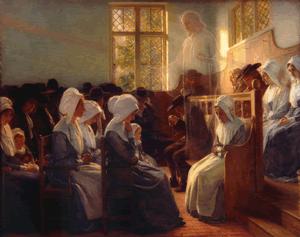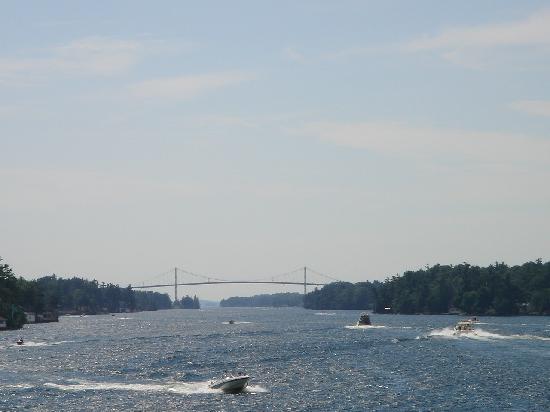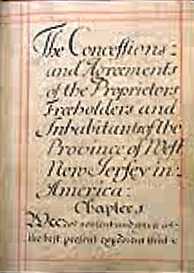
Surviving Strands of Quakerism
Of the original thirteen, there were three Quaker colonies, all founded by William Penn: New Jersey first, Pennsylvania biggest, and Delaware so small Quakerism was overcome by indigenous Dutch and Swedes.
Post-Revolutionary Delaware's leading family was DuPont, definitely non-Quaker. Nevertheless, after two centuries of dominance, the duPonts recently sold out to Dow Chemicals, exchanging family control for stockholder control. That's otherwise known as "cashing out". While it's too soon to be certain, recent intrusions of 1200 partners of Skadden Arps imply Wall Street lawyers could dominate little Delaware in the future. Not soon, but as relentlessly as Han Chinese intend to dominate Taiwan and Hong Kong.
Quakers once held Philadelphia, the largest city in America but voluntarily gave up political control without moving away. No controlling group had ever quite done that, but it was probably predictable from the prior case of the Welsh Barony of the Main Line, which refused power when they could see no point to having it. By the way, what is the purpose of political control of anything? Until that is explained, why do so many tribes go to the bother of it?
At first, or at least until railroads arrived, the West Jersey (Southern) half of New Jersey remained closest to what William Penn had envisioned, The Northern rest of it is essentially part of newcomer New York..
The Western half of Pennsylvania was settled by way of the Erie Canal, and Pennsylvania's modern political sociology was summarized by James Carville as "Philadelphia, Pittsburgh, -- and Alabama in between."
New Jersey divided into North and South, matching the original Quaker divisions of East and West Jersey, presently dominated by Menedez in the North, and Norcross in the South, uneasily held together by unions and the Mafia.Only Philadelphia still has political machines of Nineteenth-Century style, seventy years Republican, then seventy years Democratic. Briefly, the Dilworth-Clarke aristocrats toppled the industrial Republicans in 1950, and since then political control has been contested between white unions and black voters, while aristocrats retreated by train and auto to the suburbs. It never bothered the Quakers much, so it was certainly predictable.
What's unpredictable is whether Philadelphia will gradually return to industrial Republicanism, or whether "eds and meds" (colleges and medical) will assert control by adopting the spirit of Republicanism. This alternative might take the form of women and blacks both splitting into two parts, then asserting control of the part which discards entitlements as a path to success.
- Quakers: The Society of Friends According to an old Quaker joke, the Holy Trinity consists of the fatherhood of God, the brotherhood of man, and the neighborhood of Philadelphia.
- Quakers: William Penn Although Ben Franklin gets more ink lately, William Penn deserves at least equal rank among the most remarkable men who ever lived.
- Charter of Pennsylvania, from Charles II to William Penn William Penn suggested what he wanted, and the Royal bureaucracy suggested suitable modifications of the gift. The resulting charter is a shrewd and fair legal document, but contained a major geographical error.
- Delaware (State of)
 Originally the "lower counties" of Pennsylvania, and thus one of three Quaker colonies founded by William Penn, Delaware has developed its own set of traditions and history.
Originally the "lower counties" of Pennsylvania, and thus one of three Quaker colonies founded by William Penn, Delaware has developed its own set of traditions and history.
- Northern Overland Escape Path of the Philadelphia Tories 1 of 1 (16)
 Grievances provoking the American Revolutionary War left many Philadelphians unprovoked. Loyalists often fled to Canada, especially Kingston, Ontario. Decades later the flow of dissidents reversed, Canadian anti-royalists taking refuge south of the border.
Grievances provoking the American Revolutionary War left many Philadelphians unprovoked. Loyalists often fled to Canada, especially Kingston, Ontario. Decades later the flow of dissidents reversed, Canadian anti-royalists taking refuge south of the border.
- Quaker Peace Testimony New topic 2016-12-04 04:05:49 description
- Slavery and Quakerism Quakers wanted to free their own slaves peacefully; Bostonians wanted to abolish slavery, punish slaveholders.
- Quakers: All Alike, All Different Quaker doctrines emerge from the stories they tell about each other.
- The Proprietorship of West Jersey The southern half of New Jersey was William Penn's first venture in real estate. It undoubtedly gave him bigger ideas.
- North of Market The term once referred to the Quaker district along Arch Street, and then to a larger district that had its heyday after the Civil War, industrialized, declined, and is now our worst urban problem area.
- Tourist Trips Around Philadelphia and the Quaker Colonies The states of Pennsylvania, Delaware, and southern New Jersey all belonged to William Penn the Quaker. He was the largest private landholder in American history. Using explicit directions, comprehensive touring of the Quaker Colonies takes seven full days. Local residents would need a couple dozen one-day trips to get up to speed.
- Quaker Gardens New topic 2016-12-04 04:23:55 description
- Quakers and Government

- Quaker Theology New topic 2016-12-04 04:18:19 description
- Quaker Values and Service New topic 2016-12-03 20:19:53 description
- Quaker Business New topic 2016-12-04 04:11:17 description
- Philadelphia Medicine The first hospital, the first medical school, the first medical society, and abundant Civil War casualties, all combined to establish the most important medical center in the country. It's still the second largest industry in the city.
- Philadelphia Physicians Philadelphia dominated the medical profession so long that it's hard to distinguish between local traditions and national ones. The distinctive feature is that in Philadelphia you must be a real doctor before you become a mere specialist.